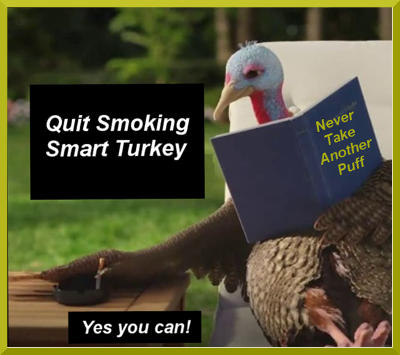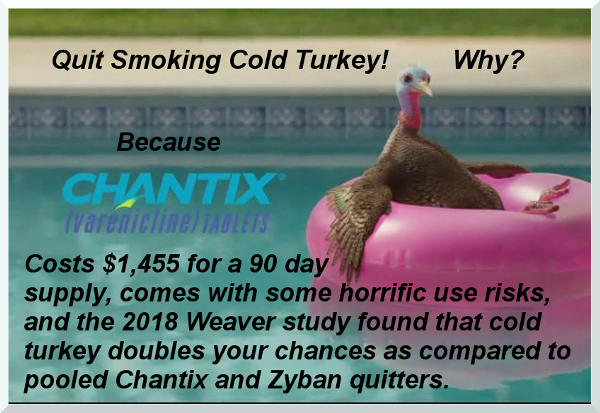
Pfizer Chantix commercial steals cold turkey
February 6, 2019 John R. Polito
Risky and expensive quitting pill masquerades as cold turkey’s lovable mascot
Last year, Pfizer’s hit Chantix ads featured “tough guy” actor Ray Liotta claiming that he was only able to quit after taking Chantix, when two years earlier he'd claimed to have quit smoking years before Chantix was approved.
This year’s Chantix ad features an adorable pool loving and yard working turkey. Taking direct aim at the smoker’s natural quitting instinct - abrupt cessation - Pfizer appropriates and rebrands cold turkey as “slow turkey.”
Why slow? Because, according to the commercial, “with Chantix you can keep smoking at first and ease into quitting.”
And how long is “at first”? "Have your cake and eat it too," the ad clearly plays and preys upon every addict’s dream of quitting ... but not just yet.
So, last year’s Chantix selling point was to stop smoking, while this year’s is to "keep smoking." What next?
In fairness, the differences between Chantix and cold turkey are vastly more than when quitting begins. While Chantix’s recommended use period is long (either 12 or 24 weeks), risky (including "suicidal thoughts or actions"), and expensive ($1,455 for a 90 day supply), cold turkey is fast, safe and free.
How fast? Having taught smart turkey quitting for more than 40 years, Joel Spitzer’s online library is home to more than 500 recovery lessons. The newest, added February 3, is entitled “The importance of the first three days of your quit.” In it, Joel shares how quickly cold turkey quitters move beyond peak withdrawal.
Pfizer's commercial opens with a direct attack upon abrupt cessation. “It’s tough to quit smoking cold turkey.”
This assertion despite Pfizer awareness that the 2018 Weaver study -- the most comprehensive population-level quitting methods study yet -- found that 11 times as many smokers quit smoking cold turkey than with Chantix.
Could Pfizer possibly have been referring to Chantix’s real-world effectiveness instead of it’s lack of productivity? There, again according to the Weaver study, cold turkey doubles your chances versus Chantix.
Let’s review: much quicker, totally safe, cost-free, up to twice as effective, generating vastly more successful ex-smokers, it’s easy to see why, within a single ad, Pfizer attacks, steals, and attempts to repackage smoker confidence in earth’s undisputed population-level quitting champ.
Steal? Scroll through the images being shared at Turkeyville, WhyQuit’s 12,000 member Facebook support group. Clearly, Pfizer was aware that cold turkey sites and quitters have long used lovable and feathery turkey images as cold turkey mascots.
Except for suggesting that one turkey is fast and the other slow, the commercial otherwise implies that Chantix and cold turkey are substantially similar. Nonsense.
Chantix, a/k/a varenicline, is a partial agonist which activates acetylcholine receptors, causing the release of dopamine, while blocking nicotine from doing so. “Slow turkey” implies that cold turkey does too. It doesn't.
What cold turkey does is to restore life as dopamine's agonist.
Full and complete nicotine cessation means that within 3 days the mind and body have no choice but to become 100% nicotine-free, that brain dopamine pathway receptors have no choice but to begin re-sensitizing, and that peak withdrawal has no choice but to arrive and pass, as the most challenging part of recovery is now in the rear view mirror.
Pfizer recommends a minimum of 90 days of using varenicline to stimulate dopamine pathway receptors. But the effects may actually be felt longer as varenicline’s elimination half-life is 24 hours, 12 times longer than nicotine’s (roughly 2 hours). This can become important should the user experience an adverse Chantix reaction.
So, while cold turkey quitters begin adjusting to natural dopamine pathway stimulation within 3 days, neuronal re-sensitization is delayed in Chantix users until they stop taking it and sufficient time passes to eliminate it.
As for use risks, did you notice how Pfizer introduced its use risks list? Ask yourself while reading the following ad script paragraph, does Pfizer want smokers to believe that the risks presented are "nicotine withdrawal symptoms" that may be experienced by all quitters?
"When you try to quit smoking, with or without Chantix, you may have nicotine withdrawal symptoms. Stop Chantix right away if you have changes in behavior or thinking, aggression, hostility, depressed mood, suicidal thoughts or actions, seizures, new or worse heart or blood vessel problems, sleepwalking, or life threatening allergic and skin reactions," "which can include swelling of face, mouth, throat; a rash, peeling skin or blisters."
To be clear, while true that there is a normal and expected sense of emotional loss associated with ending any long and intense relationship, suicidal thoughts or actions, seizures, new or worse heart or blood vessel problems, and life threatening allergic and skin reactions are not cold turkey quitting risks.
What Pfizer will never tell smokers is that each and every year more nicotine addicts arrest their chemical dependence by going cold turkey than by all other methods combined. What it won't share is the key to successful abrupt nicotine cessation: being taught or eventually self-discovering that one equals all, that lapse equals relapse. Brain scan studies teach us that just one puff and up to 50% of dopamine pathway receptors become occupied by nicotine.
Research shows that while most walk away from trying to cheat when quitting feeling like they've gotten away with it, it isn't long before they find their brain wanting, plotting to obtain or even begging for more.
Full recovery is vastly more doable and far more wonderful than the urge preceeding that next fix will suggest. In fact, as Pfizer knows, it's impossible to fail so long as all nicotine remains on the outside.
Why wait? Imagine that first brave step in saying "no" to that next cigarette, or "not now," or "I want to wait and feel my healing." Imagine that step starting you down the path toward ever increasing periods of calm and quiet. And all it takes is a mindset that strives to get as comfortable as possible being temporarily uncomfortable.
Time your urges as withdrawal time distortion can make a three minute crave episode feel far longer. And be sure to watch WhyQuit's basic "how to quit" video, as it's packed with recovery insights.
Baby steps, just one challenge at a time, yes you can!
I, John R. Polito, am fully and solely responsible for the content of this article. Any factual error will be promptly corrected upon notice emailed to john@whyquit.com



